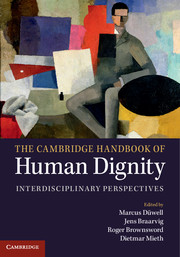Book contents
- Frontmatter
- Contents
- List of contributors
- Foreword
- Why a handbook on human dignity?
- Acknowledgments
- 1 Human dignity from a legal perspective
- 2 Human dignity: concepts, discussions, philosophical perspectives
- Part I Origins of the concept in European history
- Part II Beyond the scope of the European tradition
- Part III Systematic conceptualization
- 19 Social and cultural presuppositions for the use of the concept of human dignity
- 20 Is human dignity the ground of human rights?
- 21 Human dignity: can a historical foundation alone suffice? From Joas’ affirmative genealogy to Kierkegaard's leap of faith
- 22 Kantian perspectives on the rational basis of human dignity
- 23 Kantian dignity: a critique
- 24 Human dignity and human rights in Alan Gewirth's moral philosophy
- 25 Human dignity in the capability approach
- 26 Human dignity in Catholic thought
- 27 Jacques Maritain's personalist conception of human dignity
- 28 Scheler and human dignity
- 29 Dignity and the Other: dignity and the phenomenological tradition
- 30 Dignity, fragility, singularity in Paul Ricœur's ethics
- 31 Human dignity as universal nobility
- 32 Dignity in the ubuntu tradition
- 33 Posthuman dignity
- 34 Dignity as the right to have rights: human dignity in Hannah Arendt
- 35 Individual and collective dignity
- Part IV Legal implementation
- Part V Conflicts and violence
- Part VI Contexts of justice
- Part VII Biology and bioethics
- Appendix 1 Further reading
- Appendix 2 Universal Declaration of Human Rights
- Index
- References
32 - Dignity in the ubuntu tradition
from Part III - Systematic conceptualization
Published online by Cambridge University Press: 05 March 2015
- Frontmatter
- Contents
- List of contributors
- Foreword
- Why a handbook on human dignity?
- Acknowledgments
- 1 Human dignity from a legal perspective
- 2 Human dignity: concepts, discussions, philosophical perspectives
- Part I Origins of the concept in European history
- Part II Beyond the scope of the European tradition
- Part III Systematic conceptualization
- 19 Social and cultural presuppositions for the use of the concept of human dignity
- 20 Is human dignity the ground of human rights?
- 21 Human dignity: can a historical foundation alone suffice? From Joas’ affirmative genealogy to Kierkegaard's leap of faith
- 22 Kantian perspectives on the rational basis of human dignity
- 23 Kantian dignity: a critique
- 24 Human dignity and human rights in Alan Gewirth's moral philosophy
- 25 Human dignity in the capability approach
- 26 Human dignity in Catholic thought
- 27 Jacques Maritain's personalist conception of human dignity
- 28 Scheler and human dignity
- 29 Dignity and the Other: dignity and the phenomenological tradition
- 30 Dignity, fragility, singularity in Paul Ricœur's ethics
- 31 Human dignity as universal nobility
- 32 Dignity in the ubuntu tradition
- 33 Posthuman dignity
- 34 Dignity as the right to have rights: human dignity in Hannah Arendt
- 35 Individual and collective dignity
- Part IV Legal implementation
- Part V Conflicts and violence
- Part VI Contexts of justice
- Part VII Biology and bioethics
- Appendix 1 Further reading
- Appendix 2 Universal Declaration of Human Rights
- Index
- References
Summary
What the ‘ubuntu tradition’ in the title of this chapter refers to is the conception of how one ought to live that was prominent among pre-colonial societies below the Sahara desert and that continues to inform much moral reflection among black Africans in the region. ‘Ubuntu’ literally means humanness or personhood among speakers of Zulu, Xhosa and Ndebele in southern Africa, and it has cognates in many other African languages, for example ‘botho’ in Sotho-Tswana, ‘hunhu’ in Shona and ‘utu’ in Swahili (Broodryk 2002: 14, 31). The term ‘ubuntu’ is often used to concisely sum up a particular view of what is morally fundamental, roughly, to live a genuinely human way of life or to become a real person.
As one would expect of a large and diverse region such as sub-Saharan Africa, conceptions of what (genuine) humanness or (real) personhood consists of are far from uniform. Nonetheless, there are certain ideas associated with talk of ‘ubuntu’ and related terms that one encounters recurrently, and they are what I focus on here, particularly insofar as they bear on the value of dignity as the ground of human rights articulated in the Universal Declaration of Human Rights of 1948.
- Type
- Chapter
- Information
- The Cambridge Handbook of Human DignityInterdisciplinary Perspectives, pp. 310 - 318Publisher: Cambridge University PressPrint publication year: 2014
References
- 10
- Cited by



